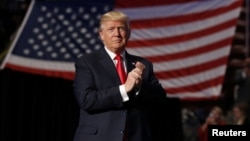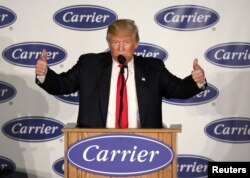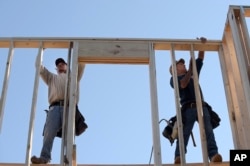If President-elect Donald Trump tries to keep some of his signature campaign promises, such as restoring U.S. manufacturing jobs and repairing the country's deteriorating infrastructure, he is likely to encounter a variety of conflicting forces and political priorities that will weigh heavily on his management of the economy, the world's largest.
Trump faces a daunting task to fulfill his campaign vow to restore U.S. industrial jobs lost to automation and overseas sites, where corporations pay workers far less than they do in the United States. At the same time, his promise to initiate a trillion-dollar plan to repair the country's deteriorating roads, bridges and other infrastructure already is running into headwinds in the Republican-controlled Congress.
While he is seeking to boost the economic fortunes of the blue-collar workers with limited formal education whose votes helped send him to a four-year term in the White House, Janet Yellen, the chair of the country's independent central bank, said this week that the cornerstone of success for many Americans was getting a college education.
"Economists are not certain about many things," the Federal Reserve leader said. "But we are quite certain that a college diploma or an advanced degree is a key to economic success."
Higher earnings
"Those with a college degree are more likely to find a job, keep a job, have higher job satisfaction and earn a higher salary," Yellen said. "The advantage in earnings is large. College grads' annual earnings last year were, on average, 70 percent higher than those with only a high school diploma. Back in 1980, the difference was only 20 percent. The gap in earnings is significant only a few years after graduation — almost $18,000 a year, according to some recent data.
"Beyond these advantages, research also shows that a college or graduate degree typically leads to a happier, healthier and longer life."
Trump, with $7 million in tax incentives, successfully kept a heating and air conditioning company from moving 800 factory jobs to Mexico, but the U.S. has lost 5 million manufacturing jobs since 2000. In an effort to reverse that trend, Trump said he would try to get Congress to impose a 35 percent tax on products made in other countries by companies that have left the U.S. and then try to send them back across the border. That, however, could ignite an international trade war.
Infrastructure
The president-elect has continued to boast about his infrastructure plans, telling supporters on his "thank-you tour," "We will build new roads, tunnels, bridges, railroads, airports, schools and hospitals." That is stimulative spending normally undertaken when a failing national economy needs a boost, not when its economic fortunes are improving, as is the case with the United States and its 4.6 percent jobless rate.
Such a massive spending proposal is at odds with the Republican Party's professed aim of shrinking U.S. government spending. Senate Republican leader Mitch McConnell of Kentucky told reporters earlier this month, "What I hope we will clearly avoid, and I'm confident we will, is a trillion-dollar stimulus." Conservative Republican lawmakers also have voiced their opposition to the Trump plan.
Ken Simonson, the chief economist for a key construction trade group, the Associated General Contractors of America, told VOA that Trump "will have quite a selling job" to win approval for an infrastructure spending plan. Simonson said Trump's Republican colleagues in Congress would be opposed to higher taxes, while Democratic lawmakers are opposed to tax credits that would benefit wealthy investors and "not lead to sufficient job creation."
He said his trade group worried that Trump's plan would be "a one-time event and not sufficient over a longer period of time" to rebuild the country's infrastructure.
Even if Congress were to approve an infrastructure spending plan, Simonson said, the construction trades face another problem: finding enough skilled workers. There now are 6.7 million U.S. construction workers, down 1 million from the peak in mid-2006, with many of the departed workers moving to jobs in other fields or retiring.
Mark Vitner, the senior economist at Wells Fargo Bank, one of the country's largest, said, "I think the best way to think about Donald Trump is about the direction he wants to go, rather than the absolute words."
Vitner said the U.S. "will spend more money on infrastructure" regardless of whether Congress specifically allocates more funding for new construction.
He said Trump could overturn President Barack Obama's rejection of a key oil pipeline running from Canada through the central U.S. to refineries on its southern border, approve construction of more natural gas pipelines and streamline environmental reviews to speed construction of other projects.
"These are a lot of things that can impact the economy," Vitner said.
He said Trump would not be able to bring back the specific jobs lost from the country's industrial heartland, where he won the votes of disgruntled workers.






